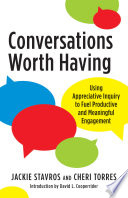

In 'Conversations Worth Having', the authors emphasize that not all conversations are created equal. Meaningful conversations are those that foster connection, understanding, and collaboration. They highlight the difference between transactional dialogues and those that delve deeper into personal values, beliefs, and aspirations. The book argues that by engaging in meaningful conversations, individuals can create stronger relationships, enhance teamwork, and drive innovation. The authors provide frameworks and tools to facilitate such conversations, encouraging readers to shift their approach from superficial exchanges to deeper, more impactful dialogues.
Continue readingCuriosity is presented as a fundamental component of effective communication. The authors advocate for cultivating a mindset of curiosity, which allows individuals to explore different perspectives and gain insights that may not be immediately apparent. By asking open-ended questions and actively listening, participants can uncover underlying motivations and foster a culture of inquiry. The book illustrates how curiosity can transform conversations from mere exchanges of information into opportunities for learning and growth, ultimately leading to better decision-making and problem-solving.
Continue readingThe authors stress the importance of creating a safe environment where individuals feel comfortable expressing their thoughts and feelings. This involves establishing trust and respect among participants, which can be achieved through active listening and validation of each person's contributions. The book outlines strategies for fostering psychological safety, such as setting ground rules for discussions and encouraging vulnerability. When people feel safe, they are more likely to engage in honest and open conversations, leading to more productive outcomes and stronger relationships.
Continue readingDifficult conversations are an inevitable part of both personal and professional life. The authors provide insights on how to approach these challenging dialogues with confidence and clarity. They introduce techniques for managing emotions, framing discussions constructively, and staying focused on shared goals. The book emphasizes the importance of empathy and understanding in these situations, encouraging individuals to view conflicts as opportunities for growth and resolution rather than as threats. By mastering the art of difficult conversations, readers can enhance their conflict resolution skills and strengthen their relationships.
Continue readingStorytelling is highlighted as a powerful tool for engaging others and conveying complex ideas. The authors explain how narratives can create emotional connections and make information more relatable and memorable. By sharing personal stories or anecdotes, individuals can illustrate their points and inspire others to think differently. The book encourages readers to harness the power of storytelling to enrich their conversations, enhance persuasion, and foster a sense of community. It also provides guidance on how to craft and share impactful stories in various contexts.
Continue readingThe authors emphasize that conversations should lead to actionable outcomes. They discuss the importance of setting clear intentions for discussions and following up on commitments made during conversations. The book provides frameworks for turning dialogues into concrete actions, ensuring that discussions do not remain mere talk but translate into real-world results. By focusing on outcomes, individuals can enhance accountability and drive progress in both personal and professional spheres.
Continue readingFinally, the book advocates for ongoing development of communication skills. The authors argue that effective conversationalists are not born but made through practice and reflection. They encourage readers to seek feedback, learn from their experiences, and continually refine their approach to conversations. The book provides exercises and prompts to help individuals assess their communication styles and identify areas for improvement. By committing to continuous learning, readers can become more skilled and confident in their conversational abilities.
Continue readingThe reading time for Conversations Worth Having depends on the reader's pace. However, this concise book summary covers the 7 key ideas from Conversations Worth Having, allowing you to quickly understand the main concepts, insights, and practical applications in around 25 min.
Conversations Worth Having is definitely worth reading. The book covers essential topics including The Importance of Meaningful Conversations, The Role of Curiosity in Conversations, Creating a Safe Space for Dialogue, providing practical insights and actionable advice. Whether you read the full book or our concise summary, Conversations Worth Having delivers valuable knowledge that can help you improve your understanding and apply these concepts in your personal or professional life.
Conversations Worth Having was written by Cheri Torres, David L. Cooperrider, Jacqueline M. Stavros.
If you enjoyed Conversations Worth Having by Cheri Torres, David L. Cooperrider, Jacqueline M. Stavros and want to explore similar topics or deepen your understanding, we highly recommend these related book summaries:
These books cover related themes, complementary concepts, and will help you build upon the knowledge gained from Conversations Worth Having. Each of these summaries provides concise insights that can further enhance your understanding and practical application of the ideas presented in Conversations Worth Having.